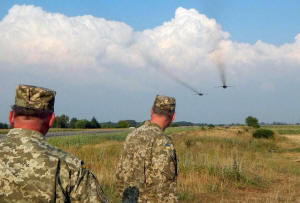|
Russia announces war games after accusing
Ukraine of terrorist plot
 Send a link to a friend
Send a link to a friend
 [August 12, 2016]
By Andrew Osborn [August 12, 2016]
By Andrew Osborn
MOSCOW (Reuters) - Vladimir Putin summoned
his security council and the Russian Navy announced war games in the
Black Sea a day after the Russian president accused Ukraine of trying to
provoke a conflict over Crimea, which Moscow seized and annexed in 2014.
The belligerent posture heightened worries in Ukraine that Russia may
plan to ramp up fighting in a war between Kiev and pro-Russian eastern
separatists that had been de-escalated by a shaky peace process.
Using some of his most aggressive rhetoric against Kiev since the height
of the war two years ago, Putin has pledged to take counter-measures
against Ukraine, which he accused of sending saboteurs into Crimea to
carry out terrorist acts.
Ukraine has called the accusations false and says they look like a
pretext for Russia to escalate hostilities. Such an escalation could be
used by Putin to demand better terms in the Ukraine peace process, or to
inflame nationalist passions at home ahead of Russian parliamentary
elections next month.
The Russian leader met his top military and intelligence service brass
on Thursday and reviewed "scenarios for counter-terrorism security
measures along the land border, offshore and in Crimean air space," the
Kremlin said.
Ukrainian President Petro Poroshenko said he had ordered all Ukrainian
units near Crimea and in eastern Ukraine onto the highest state of
combat readiness. He was seeking to urgently speak to Putin, the leaders
of France and Germany, U.S. Vice President Joe Biden and European
Council President Donald Tusk.

In Washington, State Department spokeswoman Elizabeth Trudeau said the
United States was extremely concerned and called on both sides to reduce
tension and rhetoric.
In New York, the U.N. Security Council held a closed-door meeting at
Ukraine's request to discuss the growing tensions.
Ukrainian U.N. Ambassador Volodymyr Yelchenko warned that Russia had
amassed more than 40,000 troops in the region and said the build-up
could reflect "very bad intentions."
Oleh Slobodyan, a spokesman for the Ukrainian border guards, said he had
observed an uptick in Russian military activity in northern Crimea in
recent days after heavier fighting in eastern Ukraine.
"These troops are coming with more modern equipment and there are air
assault units," he told a news briefing in Kiev.
The Russian Defence Ministry said its navy - whose Black Sea Fleet is
based in Crimea - would start to hold exercises in the area to practice
repelling underwater attacks by saboteurs.
There were reports on Thursday evening that the authorities had cut off
Internet access in northern Crimea close to Ukraine.
PUTIN'S PLAY
Russia says it caught infiltrators after at least two armed clashes on
the border between Crimea and Ukraine over the weekend, and one of its
soldiers and an FSB security service employee were killed. Kiev denies
the events ever happened.
Whatever the truth, the allegations have already scuppered planned talks
about eastern Ukraine slated for the sidelines of a G20 summit in China
next month. Putin said such talks would now be "pointless."

In an editorial, the Russian newspaper Vedomosti said escalation was a
proven Kremlin tactic ahead of negotiations. Putin was trying either to
alter or to tear up the Minsk peace process, named for the Belarus
capital where truces were hammered out for the war in eastern Ukraine's
Donbass region.
"Events in Donbass in 2014-15 showed that the Kremlin tactic is to raise
the stakes before negotiations. The main political question now is what
will happen to the Minsk process. Will Russia break away from it or will
it demand new concessions?" the newspaper wrote.
"Putin in his rhetoric has returned to the start of 2014. Once again, he
does not deem the Ukrainian authorities legitimate."
Volodymyr Fesenko, a political analyst in Ukraine, said he thought the
Kremlin had its own revised peace plan for eastern Ukraine up its
sleeve.
"Putin will scare the West with the prospect of full-scale conflict with
Ukraine," he said. "He is trying to increase pressure on Kiev to force
Ukraine to accept a Russian plan to resolve the conflict in the east.
"Putin won't go all out for a big war. But there might be pinpoint
military operations against radicals whose bases are located near the
border with Crimea."
PUTIN'S AIMS
The European Union and the United States have tied the success of talks
under the Minsk process to any possible decision to lift financial
sanctions imposed on Russia over the Ukraine crisis.
[to top of second column] |

Ukrainian servicemen watch Sukhoi Su-24 front-line bombers fly
during military aviation drills as Russia accuses Ukraine in
incursion into annexed Crimea, in Rivne region, Ukraine, August 10,
2016. Picture taken August 10, 2016. REUTERS/Stringer

But Moscow has grown increasingly frustrated by the talks and by
what it says is Ukraine's refusal to fulfill the terms of the truce.
Kiev for its part says Moscow is the one that is still stirring
tensions among pro-Russian separatists.
Escalating tension over Crimea could give Putin a pretext to abandon
talks altogether, or demand changes to their format and terms, while
holding out the prospect of a full-scale renewal of hostilities if
he doesn't get what he wants.
It could also help rally Russians ahead of the parliamentary vote,
in which the main pro-Kremlin United Russia Party might struggle to
win as many votes as usual because of an economic slump caused by
low oil prices as well as the sanctions.
"While polls show United Russia doing okay (60 percent support),
Putin never likes to take chances with domestic politics," Timothy
Ash, a strategist at Nomura Bank, wrote in a note. "(He) will want
to impress on the Russian electorate his own strength and how lucky
they are to be Russian citizens as perhaps compared to their
Ukrainian counterparts."
The imbroglio also gives Crimea's pro-Russian authorities an excuse
for their failure to raise living standards since Russia took over.
Sergei Aksyonov, the Russian-backed prime minister, told state TV he
blamed the Ukrainian incursions on the U.S. State Department.
Putin may also hope instability in Ukraine can feed into the U.S.
presidential election campaign, where Republican candidate Donald
Trump accuses President Barack Obama's administration of
incompetence and has called for better ties with Moscow. Putin may
yet hope to cut a deal on both Ukraine and Syria, the two big issues
of contention with Washington, before Obama exits.

What actually happened in and around Crimea at the weekend remains
disputed. U.S. ambassador to Ukraine Geoffrey Pyatt said Washington
had so far seen nothing to corroborate Russia's version. A
spokeswoman for EU foreign affairs chief Federica Mogherini also
said there had been no independent confirmation.
Russia's Kommersant newspaper on Thursday cited unnamed security
sources as saying a group of men Russia had arrested for planning
attacks had confessed to seeking to destroy Crimea's tourist
industry by bombing resorts.
The sources told Kommersant two of seven saboteurs in one group had
been killed and five captured.
Russian state TV on Thursday evening broadcast footage of one of the
detained men being interrogated by the FSB security service. The
man, whose name was given, said he had been part of a group of
saboteurs working for Ukrainian military intelligence and that they
had planned to blow up a ferry, an oil refinery and a chemical
factory among other targets.
State TV aired footage of what it said was the saboteurs' weapons
cache showing a large number of mines, grenades and improvised
explosive devices laid out on the floor.
In Ukraine, the detained man's brother had earlier said he thought
his brother had been kidnapped as part of "a big game."
(Additional reporting by Matthias Williams, Pavel Polityuk, Natalia
Zinets and Alexei Kalmykov in Kiev, Maria Tsvetkova and Maria
Kiselyova in Moscow, Francesco Guarascio in Brussels, Michelle
Nichols at the United Nations and Ruthy Munoz in Washington; Editing
by Peter Graff and James Dalgleish)
[© 2016 Thomson Reuters. All rights
reserved.]
Copyright 2016 Reuters. All rights reserved. This material may not be published,
broadcast, rewritten or redistributed.
 |